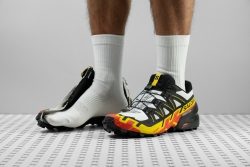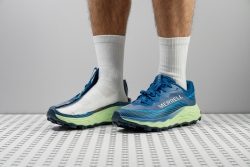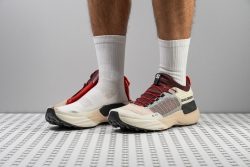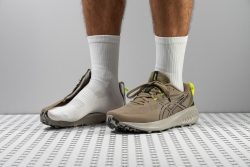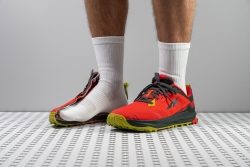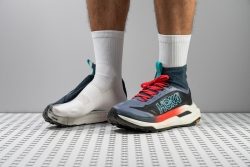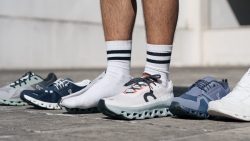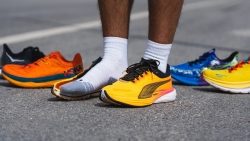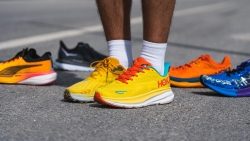6 Best Running Shoes For Spartan Race (OCR) in 2025
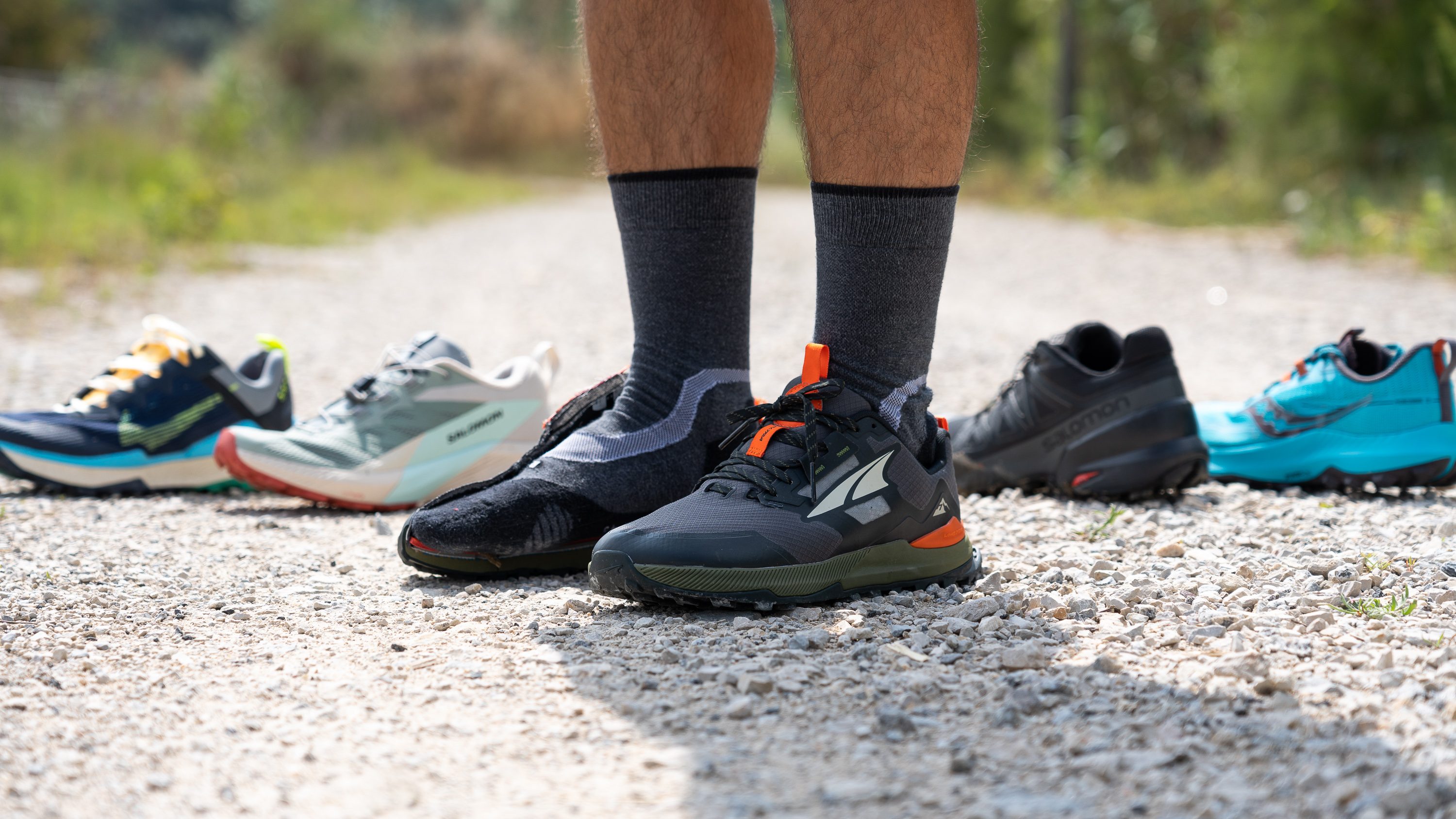
We buy shoes ourselves. We earn commissions when you buy through us, at no extra cost. Why trust us
When the arena is all muddy and you have your game face on, you can't be wearing just any random pair. No, you need to be in the best Spartan Race (OCR) running shoes on the market.
We've tested multiple Spartan Race running shoes to have an all-inclusive knowledge of each model. We organised everything we discovered while testing the shoes in our in-depth reviews so you could learn about them without leaving your seats. Indeed, this stellar selection houses the best Spartan Race (OCR) running shoes — from the most tenacious to the most well-rounded.
How we test running shoes for spartan race (OCR)
We are proud to present our spotlight-worthiest Spartan Race (OCR) running shoes. We assembled our top picks through this foolproof approach:
- We don't rely on brands sending us free kicks. Instead, we buy running shoes using our own money.
- In our own lab, we put these runners through various tests to discover their fortes. We also split them in half to display all of their elements for us to assess.
- We take them for a spin, running in every pair for miles to lock in their strengths and weaknesses. We test them out like crazy. And then we report and summarise all the significant things we find while wear testing each of them.
Best running shoes for Spartan Race (OCR) overall
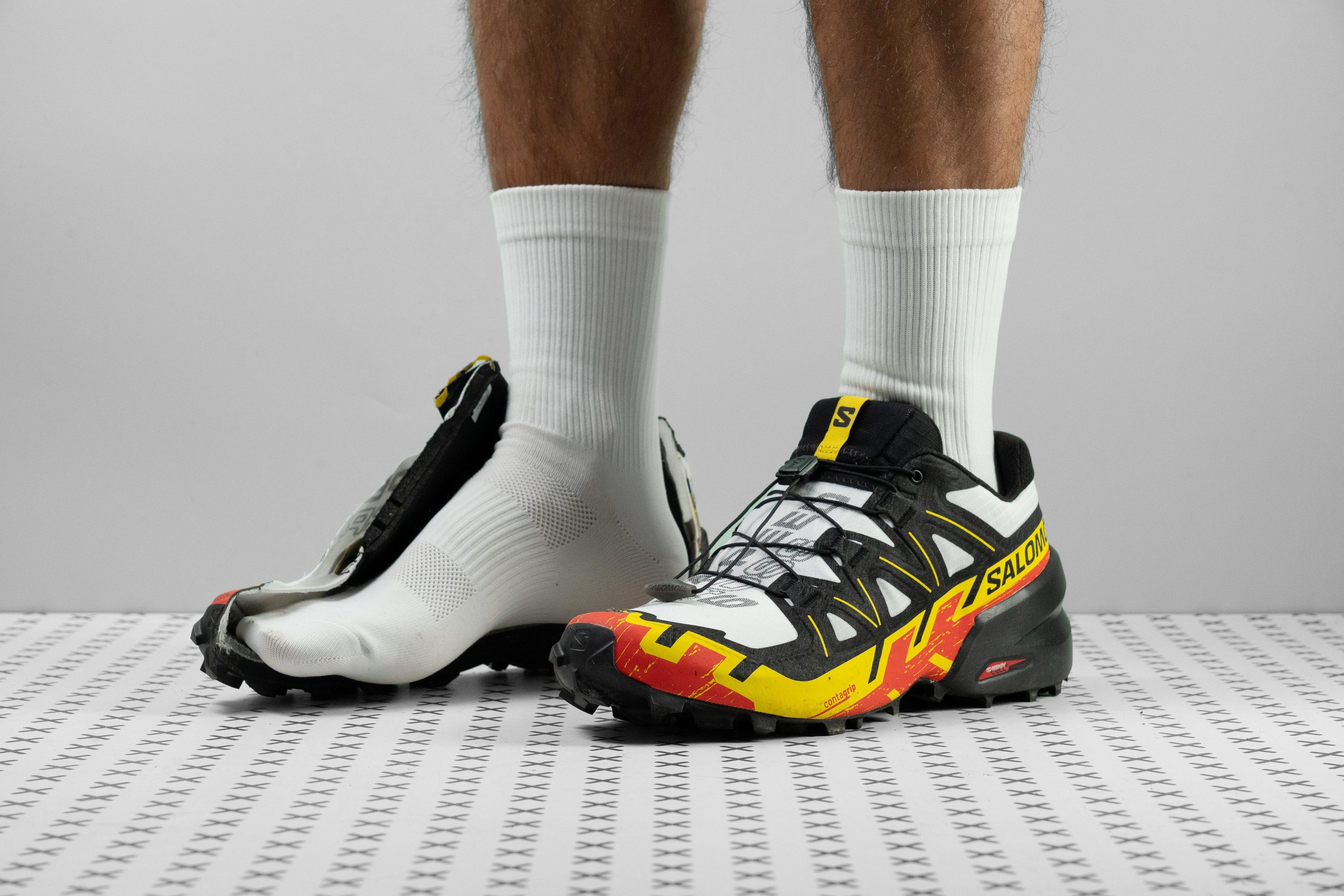




















































What makes it the best?
We ran fearlessly with Speedcross 6 and discovered it’s the best running shoe for Spartan obstacle course races. This solid and sturdy trail shoe crosses muddy paths and steep slopes with ease, offering secure lockdown, reliable traction, and protection underfoot for a comfy and worry-free Spartan experience.
This rugged pair performs best in soft and wet terrains. With 5-mm lugs sticking out, Speedcross 6 is extra grippy. The aggressive pattern supported our wall climbs and mud crawls. The design cleverly sheds off mud, too, so we didn’t have to bring the dirt home!
The tongue and mesh upper offer a lot of padding for a more comfortable experience. The Quicklace system effectively secures lockdown, which is why we had no issues with lace bite and debris sneaking inside the shoes.
Underfoot, our heel sits comfortably on a generous amount of cushioning (36.5 mm), whereas the forefoot remains low for better ground feel and control. This leads to an inclined platform with a 14.1 mm drop.
Because of its steep drop, it suits heel strikers best. We recommend midfoot and forefoot strikers to find a lower drop shoe for an enhanced running experience.
Pros
- Ideal for heel strikers
- Impressive durability
- Quick mud shedding ability
- Lightest Speedcross yet
- Secure lockdown with QuickLace system
- Enhanced ground feel in the forefoot
- Agile and responsive in fast corners
- Agile and responsive in fast corners
Cons
- Midsole feels like concrete
- Extremely poor breathability
- Not suitable for midfoot and forefoot strikers
- Low energy return
Running shoes for Spartan Race (OCR) with the best stability
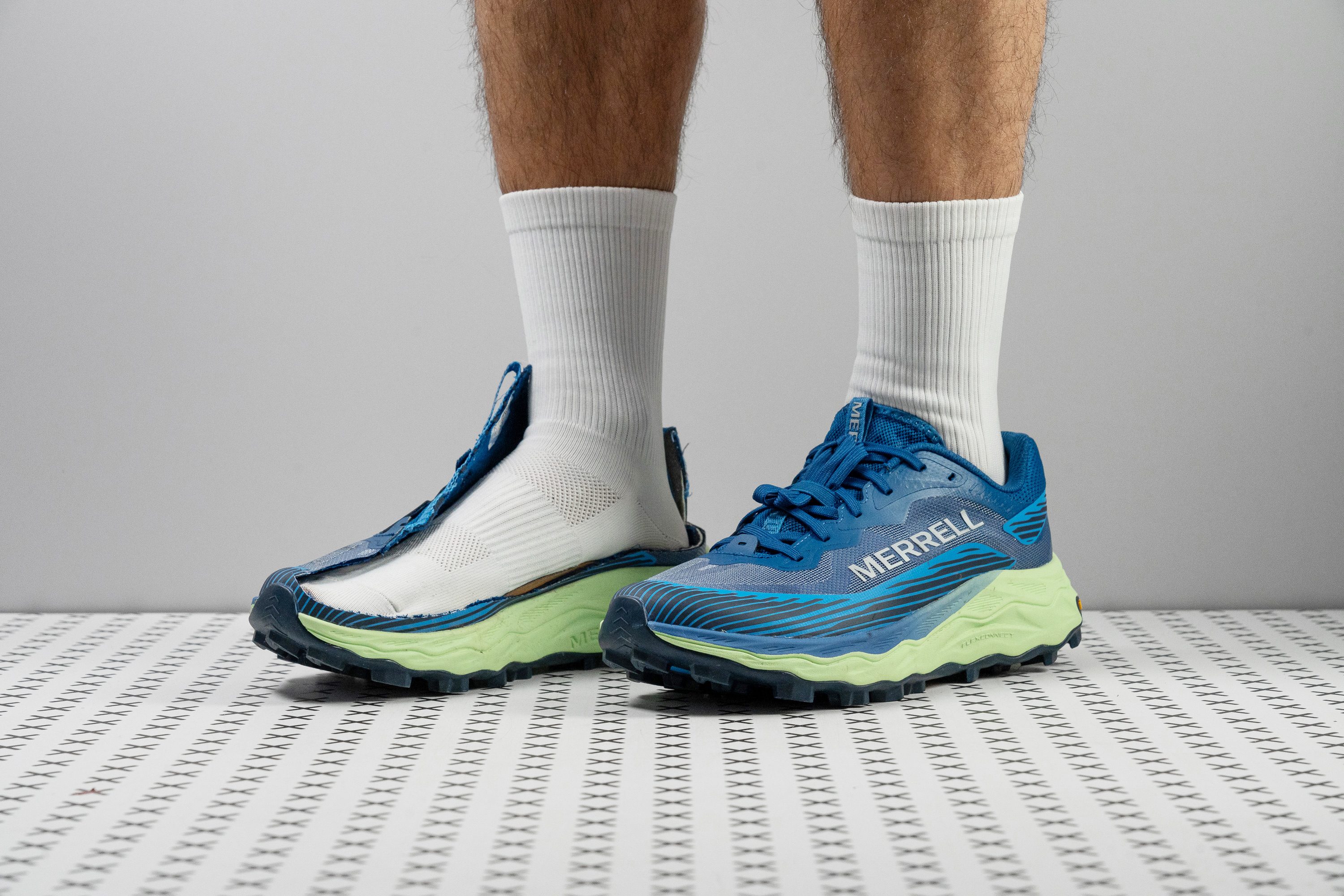

















































What makes it the best?
A mix of soft and rugged terrain of an OCR course requires both strong traction and reliable stability in a trail shoe. And we are happy to find both in the Merrell Agility Peak 6!
The 5-mm lugs of this Merrell shoe instantly show off their strong bite on muddy and grassy patches. What’s more, their widely spaced placement is highly effective at self-cleaning on the go! And if there are slick rocks along the way, the shoe’s Vibram Megagrip outsole is sticky enough to grip them, with a high friction coefficient of 0.64!
The Agility Peak 6 also helps minimise slips and unwanted ankle rolls by keeping our foot in its steady lane. The shoe’s secure upper fit, high torsional rigidity (4/5), supportive heel counter (3/5), and wide base (115.5 mm in the forefoot and 97.7 mm in the heel) keep undesirable wobbling at bay.
We also enjoy the protection and stability of the shoe’s large rock plate, which stretches from the midfoot to the toes. It mutes out sharp debris without restricting forefoot flexibility or making the Agility Peak 6 much heavier.
Pros
- Excellent Vibram outsole with Traction Lug tech
- Dependable for technical terrain
- Improved flexibility
- Secure fit
- Lighter than v5
- Good arch support
- Stable ride
- Upper mixes durability and ventilation
- Ideal for heel strikers
Cons
- FloatPro foam lacks energy return
- Narrow toebox limits toe splay
- Low shock absorption
- Misleading drop
Best lightweight running shoes for Spartan Race (OCR)
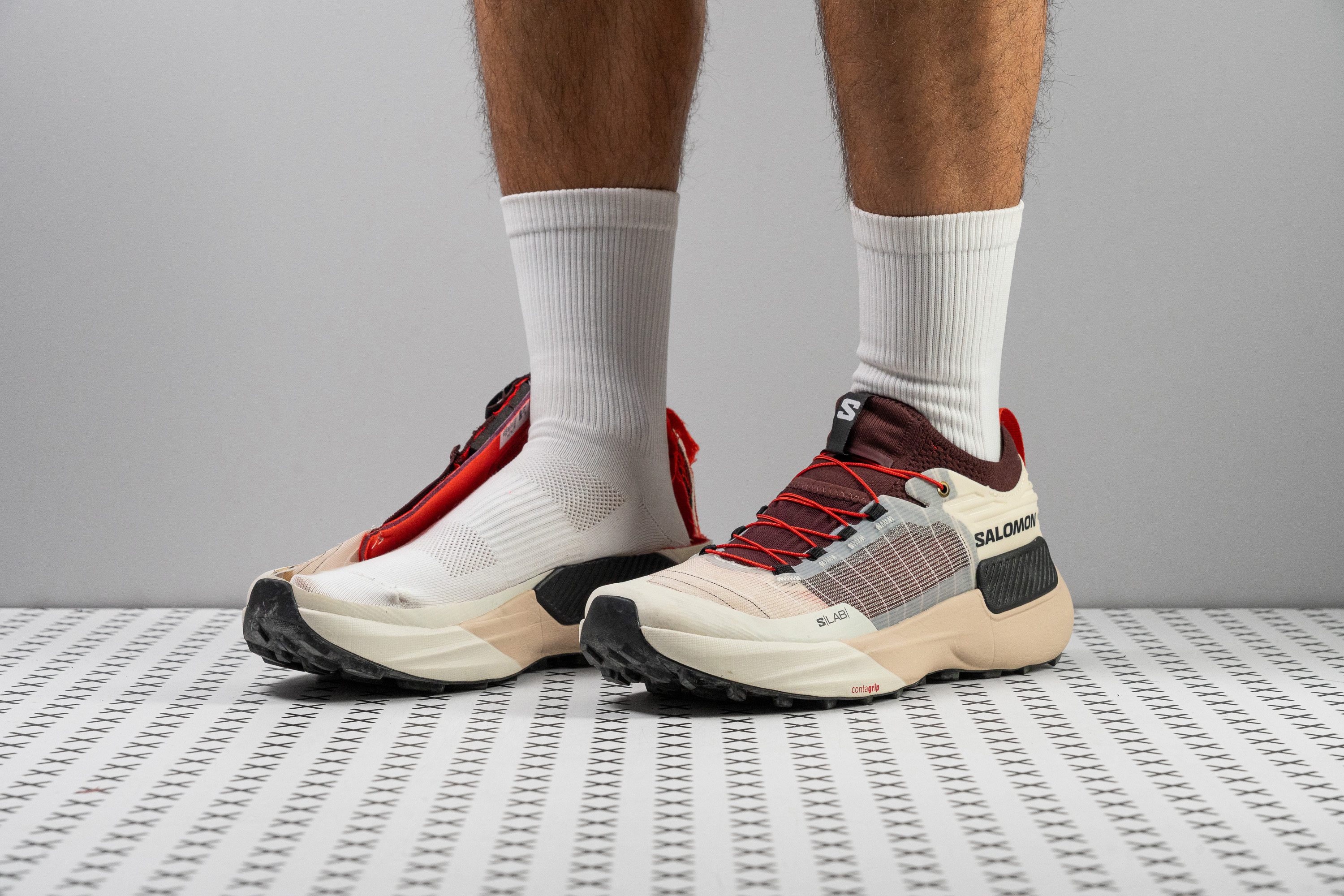
















































What makes it the best?
In our runs, the Salomon S/Lab Genesis made conquering Spartan courses a breeze with its airy build, adaptive nature, unwavering traction, and high surface feedback. Its minimal yet supportive construction proves it’s the best lightweight pair among our lab-tested Spartan OCR running shoes.
We feel quick on our feet with its exceptional lightness. Our scales show it’s only 8.8 oz (249g), a figure that’s hard to match for the 10.2 oz (289g) average trail shoe. What also keeps the feeling light is its ultra-breathable MATRYX upper that showcases strong ventilation, earning an impressive 4/5 rating in our smoke test.
The S/Lab Genesis enhances agility with its flexible design, accommodating free movement for burpees, climbs, and crawls. It feels fluid whether we twist or bend our feet. Our bend test confirms it's 4.8% more malleable than average. Control is further improved by the 4.5-mm deep and sticky chevron lugs, which efficiently shed mud for safe and stable strides.
The ride feels ground-connected, proven by its moderate 121/87 SA ratings in our shock absorption test. On foot, we could easily adapt to various surfaces and felt in control of our strides.
However, the shoe costs £200, which isn’t appealing for buyers on a budget since the average trail shoe costs only £150.
Pros
- Exceptionally lightweight
- Premium MATRYX upper
- Excellent lockdown
- Plush, well-padded tongue
- Quick and efficient Quicklace lacing system
- Works for running and hiking
- Versatile Contagrip outsole with rock plate
- Unique aesthetics
- Feels great on fast downhills
Cons
- EVA-based midsole lacks bounce
- Expensive for the technology provided
- Upper durability could be improved
- Low shock absorption
Best budget running shoes for Spartan Race (OCR)
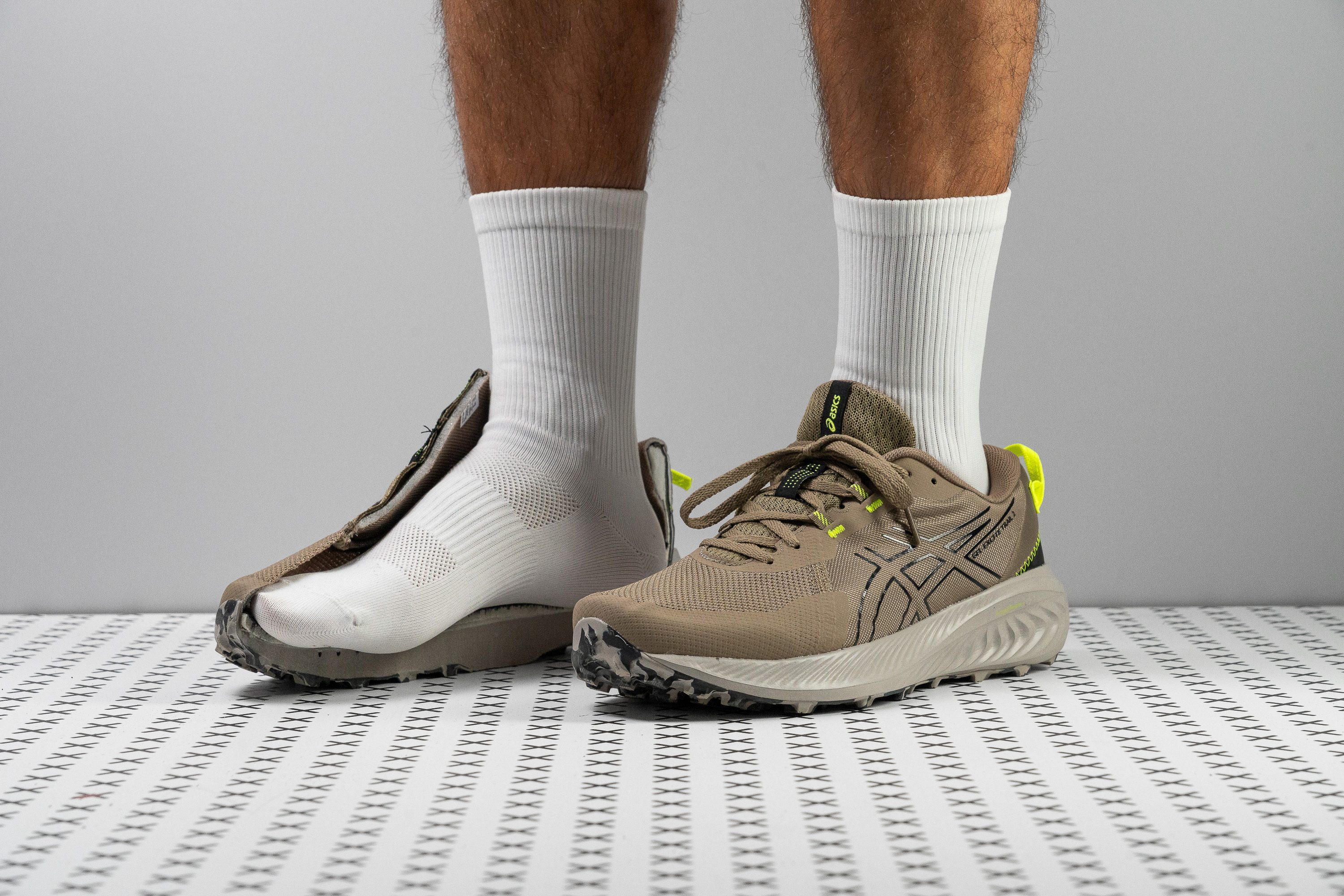












































What makes it the best?
We conquered all obstacles—from climbing, crawling, running, and jumping—with the ASICS Gel Excite Trail 2. Its flexible build enhances our agility, its strong shock absorption boosts comfort, while its traction keeps our movements controlled. Proving its versatility and reliability in the lab for its £90, it’s our ultimate budget shoe for an effortless Spartan race finish.
GET2 offers a lot despite being 42.6% cheaper than the average trail shoe. One obvious example is its generous cushioning, reaching a stack height of 37.7/27.6 mm. Not only that, it also reduces the impact of each landing effectively, with its high shock absorption score of 124 SA.
Its uncomplicated midsole boosts a sense of nimbleness as we perform various exercises. In our flex test, it emerged as a whopping 32.9% more bendable than average, making it adaptive for a wide range of movements.
Its remarkable traction seals the deal, as we felt its grippy outsole bite any surface. We ran fearlessly through the mud and climbed walls with the 4.0 mm lugs keeping us steady. For reference, the average trail shoe’s lug depth is only 3.5 mm.
GET2’s focus on versatility makes it less responsive than other trail shoes. Those who prefer more explosiveness for race days should consider a shoe with higher energy return.
Pros
- Low price
- Ideal for heel strikers
- Generously cushioned midsole
- Versatile choice for hiking and running
- Everyday plush comfort
- Excellent for beginners
- All-season design
- Reasonable weight
Cons
- Not for moderate or technical trails
- Limited outsole coverage
- Durability concerns
- Not the best for forefoot strikers
Best zero-drop running shoes for Spartan Race (OCR)
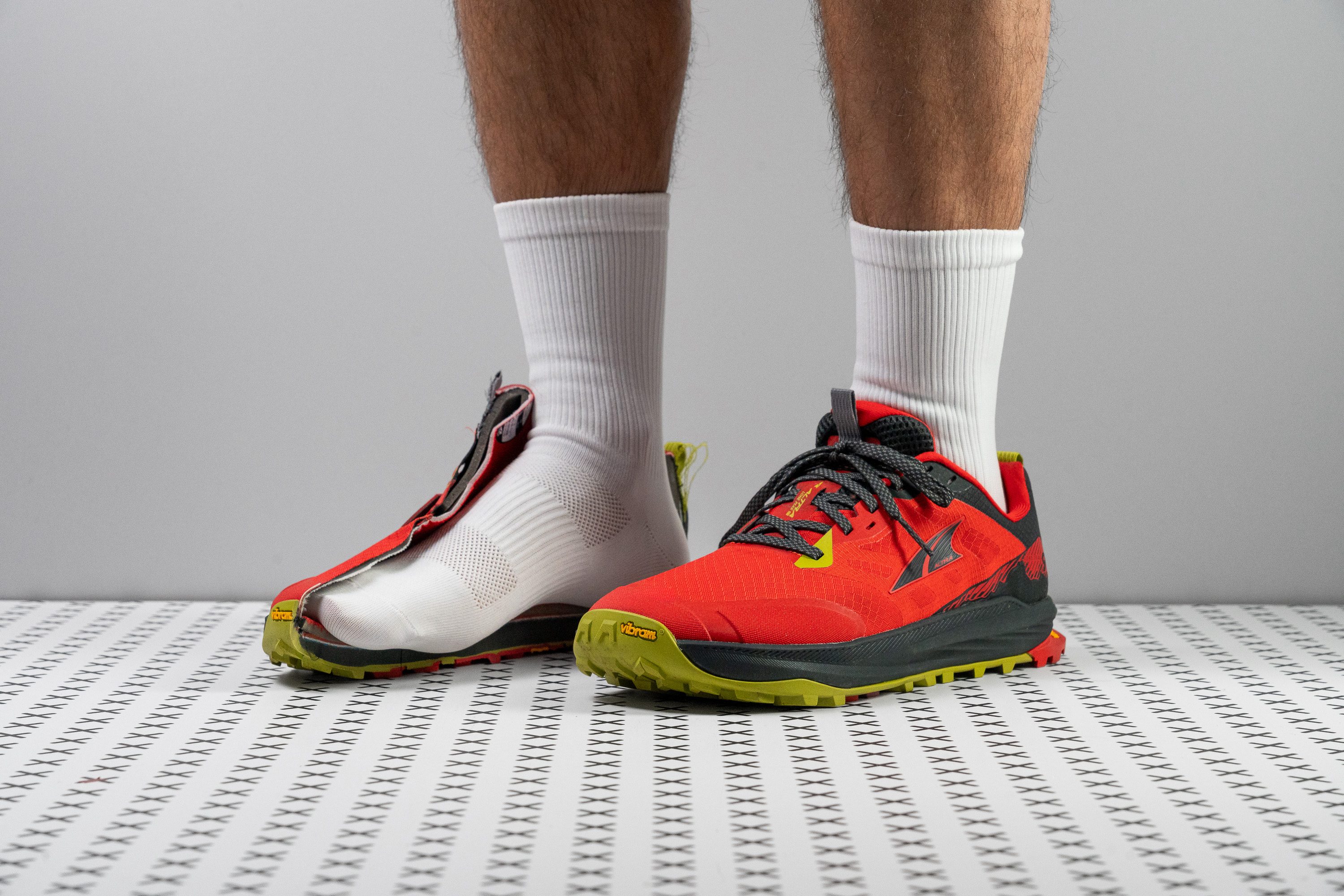






















































What makes it the best?
The Altra Lone Peak 9 gave us peak agility as it delivers the best zero-drop experience for Spartan races. It has a grounded and stable sensation that allows intuitive manoeuvring, supporting any exercise we perform—from climbing obstacles to dropping on the floor for burpees. It keeps the ride all-natural and ensures generous room for toe-splaying.
Its low and firm cushion boosts surface sensitivity, ensuring secure and stable strides. Our lab reveals a true zero heel drop compared to the 7.5 mm average, and a balanced 23.6 HA foam measurement, enhancing control during multi-directional movements since the foam won't compress unevenly.
From lunges to lifting weights, we could move freely in this pair as its wide toebox gave us breathing room to adapt easily. It features a square-shaped silhouette, confirmed by our gel mould when the big toe area emerged at a massive 85.3 mm.
We felt the LP9+ version’s reliable traction, whether on dry or wet ground. We ran fearlessly around the arena and climbed walls like a gecko. In the lab, we measured its sticky lugs to be 3.8 mm deep and positioned strategically to enhance traction.
However, we warn caution that this version is stiffer than the previous versions, losing its barefoot feel. Those who value flexible midsoles should keep exploring.
Pros
- True zero-drop geometry
- Extra-roomy, foot-shaped toebox
- Vibram option finally available
- Improved forefoot stability
- Flat-profile, natural ride
- Secure lacing system
- Still a low-stack shoe!
- Standard and wide versions
- Good durability
Cons
- Feels really heavy for its size
- Stiffer than previous versions
- Lacks airflow
- Having two outsole versions adds confusion
Running shoes for Spartan Race (OCR) with the best shock absorption
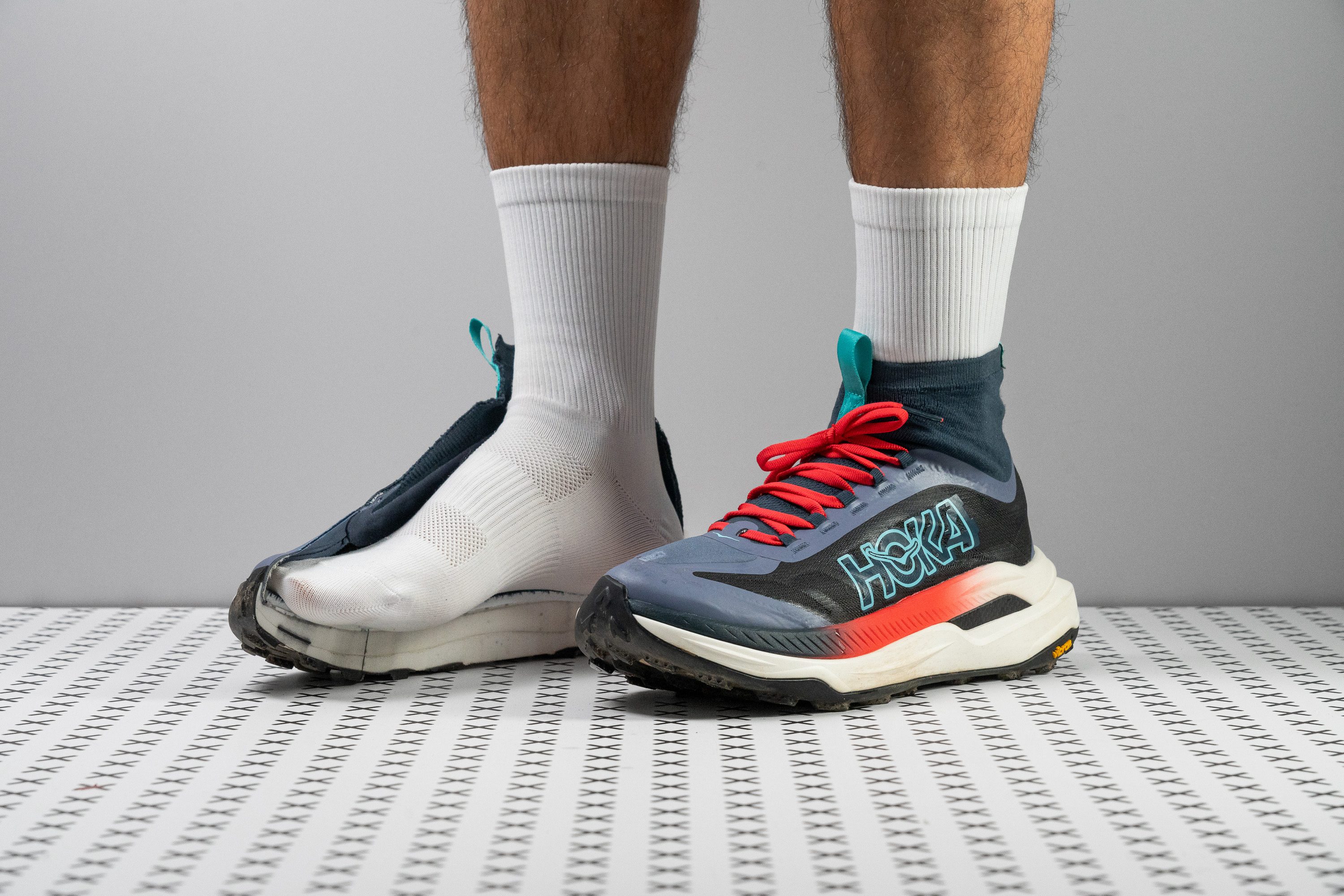


















































What makes it the best?
Hoka Tecton X 3 helped us earn the Spartan title with security and ease. It allows us to move effortlessly with its turbo-charged midsole, climb properly with its grippy outsole, and stay comfortable with its world-class impact protection. Both our lab results and feet can confirm that it offers the best shock absorption among Spartan shoes.
Every stride in our runs and every jump we perform on each obstacle didn’t feel harsh on the legs because the midsole offers exceptional muscle protection. We measured the stack at a massive 37.8/30.9 mm, ensuring all types of runners and foot strikers won’t run out of cushioning. In our shock absorption test, we verified the foam’s strain-reducing capacity with solid scores of 139 SA (heel) and 120 SA (forefoot).
Pushing the pace feels easy because the midsole offers strong and instant rebound. We validated Tecton X 3’s springiness with very high energy return scores of 69.9% (heel) and 70.2% (forefoot).
Its Vibram outsole feels steady with 4.0 mm deep lugs that stick well to the walls we climb and on the dirt trails we run on. It’s well-suited for race environments with its confidence-inspiring control.
However, Tecton X 3 lacks the flexibility for performing workouts like lunges and burpees with ease. Those seeking maximum agility should find another shoe.
Pros
- A true supershoe for trails
- Ultra-grippy and durable Vibram outsole
- Fantastic energy return from PEBA foam
- Versatile for both long runs and ultra races
- Stability improvements
- Shields from debris effectively
- Premium MATRYX upper
- Designed to dominate ultra-distance events
- Secure fit
Cons
- Sky-high price tag
- Heavier than the Tecton X 2
- Absolutely not for wide feet
- New ankle gaiter may not work for everyone

